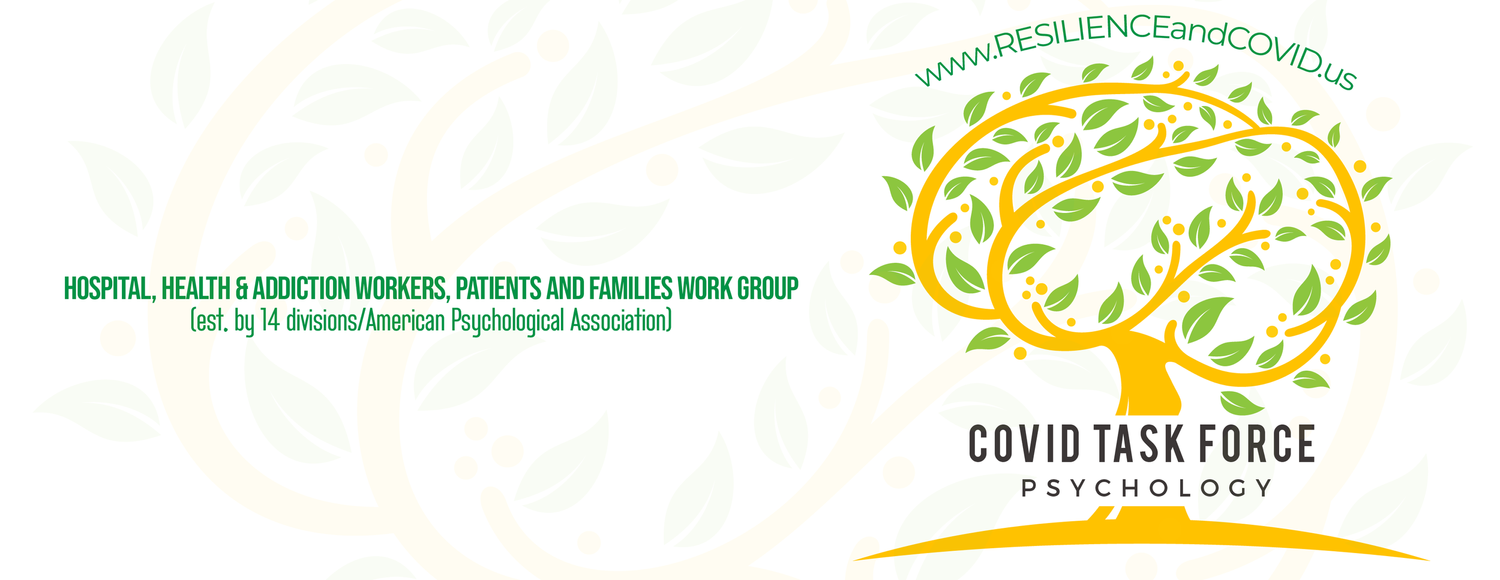Cultivating Forgiveness During COVID-19
A path to a more hopeful mindset in a world of tension.
KEY POINTS
Higher levels of self-forgiveness are associated with increased levels of compassion, personal growth, and life satisfaction during COVID-19.
Forgiveness of situations beyond one’s control are related to better mental health during COVID-19.
Perspective taking, active listening, and having compassion can provide a more open mindset when communicating different viewpoints.
This article was written by Robert M. Gordon, Psy.D., and Taylor Groth, Ph.D.
As the COVID-19 pandemic shifts into an endemic, individuals are experiencing prolonged feelings of uncertainty, unprocessed grief, and loss, and a high degree of emotional and physical exhaustion.
The pandemic has heightened political and racial tensions, highlighted health care disparities, and further polarized our cultural discourse. Kirk Schneider (2013) defines psychological polarization as the elevation of one perspective to the exclusion of competing viewpoints. This tendency toward “black-and-white thinking” pervades news and social media platforms, belying underlying feelings of fear, vulnerability, and insignificance.
Algorithms are in place to promote the news we want to see, so there is an active filter on the news/thinking/styles people receive (Tucker et al., 2018). Due to the artificial selectivity of these media channels, there is a tendency to be exposed only to information that supports one’s beliefs, opinions, and values. A current example is the polarized discourse regarding whether to get vaccinated or not, causing many networks of families and friends to resent or avoid those with opposing perspectives.
How can we gradually move on from the psychological paralysis in seeing differing viewpoints? One avenue is the psychology of forgiveness.
Source: Alex Schute/Pexels
Forgiveness
Forgiveness is an act of respecting the emotional pain of injustice or injury; intentionally trying to relinquish anger, resentment, and rumination; and cultivating kindness, understanding, and empathy toward the offender (Enright, 1991).
Forgiveness does not entail forgetting, excusing, overlooking, or reconciliation (Buechler, 2019). Forgiveness involves reflecting on our own role in creating and continuing unhealthy situations. This courageous process allows for the emergence of positive feelings related to seeing oneself as an active agent rather than a passive victim (Buechler, 2019; Safir, 1999).
Inwardly directed forgiveness or self-forgiveness involves being compassionate and kind to ourselves about our shortcomings (Neff, 2003), which can allow for personal healing and increased satisfaction with life (Thompson et al., 2005). Self-forgiveness is associated with lower anxiety, rumination, and depression (Thompson et al., 2005); thus, an individual liberated from psychological distress may be better able to offer forgiveness to others.
Models of Forgiveness of Others
Enright (2015) developed a four-stage, process-oriented approach to forgiveness involving uncovering, deciding, working, and deepening:
Uncovering involves exploring how the hurtful act and one’s reaction have impacted one’s life, including its physical and emotional toll (Freedman & Zarifka, 2016).
The deciding phase consists of a willingness to consider forgiveness as a possibility and a commitment to forgive the other.
The working phase includes reframing one’s perspective of the situation and cultivating compassion and empathy for those with different viewpoints. A critical component of this phase is reflecting on the other's background and value as a fellow human being (Freedman & Zarifka, 2016). By understanding the offender’s inner struggles, one may begin to feel empathy and compassion. One can also reflect on times when one has needed others’ forgiveness in the past (Cunningham, 1985).
The deepening phase consists of finding meaning and true priorities in life. For example, realizing that maintaining family connections is more important than winning an argument about whether or not to get vaccinated.
Research on Forgiveness
There have been a number of studies indicating the efficacy of forgiveness during COVID-19. Beltrán-Morillas and Expósito (2021) found that high levels of self-forgiveness were associated with increased personal growth and satisfaction during COVID-19. This relationship was stronger for individuals who endorsed a high level of compassion for others—possibly due to recognizing others’ suffering and how their behaviors impacted others.
Toussaint et al. (2021) found that older age was associated with more presence of meaning and forgiveness of situations beyond one’s control (e.g., life-threatening illness) and better mental health during the pandemic.
Moving Past Psychological Polarization and Paralysis Through Forgiveness
Vaccinated and unvaccinated. The masked and the unmasked. Democrats and Republicans. The wealthy and the poor. These are a few of the several divides in society, all of which have been exacerbated during COVID-19. This polarization feeds into psychological paralysis—a phenomenon that seems to have triumphed over being kind human beings. The saying, “You are either with me or against me,” seems to hold more truth than ever before. We have stopped listening to each other and have lost tolerance for opposing views, leading to resentment and avoidance of the other “side.” We ask, “Can there be a bridge to maintain relationships with the opposing side?” Perhaps most importantly, “Can forgiveness help us heal and move forward with hope and unity?”
Based on the existing literature, it is through forgiveness that we may experience increased awareness of others’ pain and greater willingness to listen (Toussaint et al., 2021), personal growth (Beltrán-Morillas et al., 2021), and hope for the future (Yalçin & Malkoç, 2015). If we can forgive ourselves and others, we can be, in the words of Sullivan (2013), “more simply human than otherwise.”
Source: Pruscilla du Preez/Pexels
Tips to Cultivate Forgiveness and Self-Compassion During the Pandemic
Recognize the humanity and imperfections in yourself and others (Neff, 2003).
Consider the context of someone else’s life that might give them their point of view.
Focus on honing your listening skills, as this is a necessary step in being open to differing viewpoints.
Make a point to listen to the other person without interrupting, to be sure you hear their entire point of view, before responding.
Tell yourself that not forgiving is a legitimate act in itself and that withholding forgiveness is a decision as hard-won as to grant it (Safir, 1999).
Say aloud a positive affirmation each day to counteract negative thoughts including the following:
“I am doing my best and I accept myself as I am.”
“Today, I deserve to treat myself with kindness and compassion.”
Concluding Thoughts
Perspective-taking, active listening, and compassion can provide a more open and flexible mindset when communicating with individuals with different viewpoints during COVID-19. Ultimately, we need to accept and forgive life for random catastrophic events and say “yes” to life with all its sorrows and joys (Buechler, 2019).
References
Beltrán-Morillas & Expósito, F. (2021). Personal growth and life satisfaction during COVID-19: Self-forgiveness and compassion as correlates. Psychological Writings, 14, 107-119. https://doi.org/10.24310/espslescpsi.v14/2.13519
Buechler, S. (2019). Psychoanalytic approaches to problems in living. Routledge.
Cunningham, B. B. (1985). The will to forgive: A pastoral theological view of forgiving. Journal of Pastoral Care, 39, 141-149.
Enright. R. D. & the Human Development Group (1991). The moral development of forgiveness. In W. Kurtines & J. Gewirtz (Eds.). Moral behavior and development (Vol. 1, pp. 123-152). Erlbaum.
Enright, R. D. & Fitzgibbons, R. P. (2015). Forgiveness therapy: An empirical guide for resolving anger and restoring hope. APA Books. https://dx.doi.org/10.1037/14526-000
Freedman, S., & Zarifkar, T. (2016). The psychology of interpersonal forgiveness and guidelines for forgiveness therapy: What therapists need to know to help their clients forgive. Spirituality in Clinical Practice, 3, 45-58. http//dx.doi.org/10.1037/scp000087
Neff, K. D., (2003). Self-compassion: An alternative conceptualization of a healthy attitude toward oneself. Self & Identity, 2, 85-101. https://dx.doi.org/10.1080/15298860309032
Safir, S. (1999). Forgiving and not forgiving: Why sometimes it’s better not to forgive. HarperCollins Publishers.
Schneider, K. J. (2013). The polarized mind: Why it’s killing us and what we can do about it. University Professors Press.
Sullivan, H. S. (2013). The interpersonal theory of psychiatry. Routledge.
Thompson, L. Y., Snyder C. R., Hoffman, L., Michael, S. T., Rasmussen, H. N., Billings, L. S., Heinz, L., Neufeld, J. E., Shorey, H. S., Roberts, J. C., & Roberts, D. J. (2005). Dispositional forgiveness of self, others, and situations. Journal of Personality, 73(2), 313-359.
Toussaint, L., Cheadle, A., Dezutter, J. & Williams, D. R. (2021). Late adulthood, COVID-19 related stress perceptions, meaning in life and forgiveness as predictors of mental health during the COVID-19 pandemic. Frontiers in Psychology. Published online 2021 Sep 19. https://doi.org/10.3389/fpsyg.2021.731017
Tucker, J. A., Guess, A., Barberá, P., Vaccari, C., Siegel, A., Sanovich, S., ... & Nyhan, B. (2018, March 19). Social media, political polarization, and political disinformation: A review of the scientific literature. https://www.researchgate.net/profile/HerveCrosnier/publication/334780056
Yalçin I., & Malkoç, A. (2015). The relationship between meaning in life and subjective well-being: Forgiveness and hope as mediators. Journal of Happiness Studies, 16(4), 915-929.
Read article on Psychology Today: https://www.psychologytoday.com/us/blog/psychological-trauma-coping-and-resilience/202203/cultivating-forgiveness-during-covid-19


